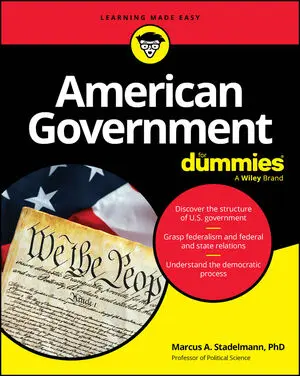Oops! Something went wrong while submitting the form.
Articles & Books From American Government
A source of unbiased, factual information on the U.S. government American Government For Dummies helps you easily understand the concepts and historical events that define the U.S. government system. This readable guide covers all the content in a typical course on American government or civics, and it offers curious readers a way to learn more about how the country is run.
Article / Updated 07-18-2022
You can gather information about your representative from his or her Web site, but if you need to contact another member or staffer of the House of Representatives, try the email formula below. Of course, you can always call or go the old-fashioned way and mail a letter. Here’s the House contact information you'll need: The House of Representatives Web site: www.
Cheat Sheet / Updated 04-19-2022
If you’re planning a trip to Washington, D.C., follow some basic recommendations for protocol when visiting with a member of Congress or a White House staffer. Plan your trip to the Capitol Building around Congressional recesses, and be sure to have all the correct contact information for the House of Representatives and Senate to make travel easier and quicker.
Cheat Sheet / Updated 03-12-2021
If the thought of politics makes you cringe, don’t worry, you can get involved as little or as much as you like in politics. If you want to voice your concerns, use these handy resources to contact your representative, and when you do call, be prepared to offer some information to them. Use a checklist of things to look for (and not look for) when searching for a candidate worthy of your vote.
Article / Updated 02-03-2020
You should tell your children some facts about politics. Who knows? Maybe some or all of it will sink in. Your kids may not look as though they’re paying attention, but they’ll probably remember. After all, someday, when you suddenly go from being the dumbest parent in the world to being okay (if only by comparison to the even dumber parents of your kids’ friends), some of these points may have an impact on your children.
Article / Updated 02-03-2020
Before the 2000 election, most U.S. residents hadn’t thought about the electoral college since high school. A few people discussed changing the electoral college after the close election of 1960, but those discussions were short-lived. Al Gore won the popular vote in 2000 by about a half-million votes, but George W.
Article / Updated 02-03-2020
Both major U.S. political parties hold conventions during the summer of a presidential election year. Delegates to each convention ratify the party’s choice for president and nominate the choice for vice president.Independent candidates for president don’t undergo the nominating process; after all, independent candidates don’t represent a party.
Article / Updated 02-03-2020
The answer is a resounding yes, but only if you’re registered to vote! If you don’t register, you declare yourself out of the game, and no one makes any effort to find out what you think or what you want. Officials don’t contact you to solicit your ideas or concerns because you don’t show up on their carefully compiled lists of registered voters.
Article / Updated 02-03-2020
Many of us — more than 255 million citizens in this country — are eligible to vote but only about 140 million voted in the 2016 national election. Every citizen of the United States who is at least 18 years of age may register and vote.Twenty-one states and the District of Columbia permit some form of same day registration.
Get up to speed on the U.S. political system Confused by caucuses, primaries, and pollsters? Puzzled by the various parties and special interest groups? Politics For Dummies has everything you need to understand local, state, and national politics; how to communicate with your elected officials; and what your representatives can do for you.




